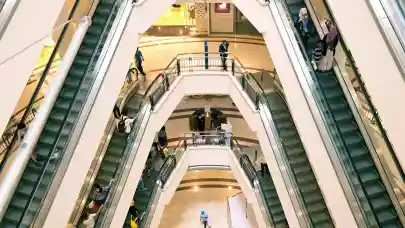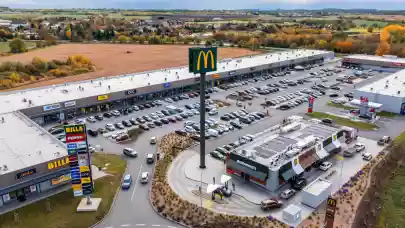
In the past twelve months, retail properties have tried to make up for the challenges faced in the first year of the pandemic. Summarizing 2021 for the modern retail space sector, experts from BNP Paribas Real Estate Poland pointed to several key phenomena regarding the sector, including: a quick return of shoppers to retail facilities, retail parks standing becoming stronger, e-commerce continuing the way of the stable growth, as well as the increasingly important role of sustainable development and ESG policy.
At the end of 2021, there was over 15.4 million sqm of retail space on hand in Poland. Most of it in Warsaw (over 2.1 million sqm), in the Katowice conurbation (1.5 million sqm) and in the Tricity (965,000 sqm). In spite of an increasing maturity of the retail sector and an its saturation, during the last quarter of the year, the sector managed to grow by 165,000 sqm of new supply. A list of the largest, freshly opened facilities, includes: Galeria Andrychów (23,000 sqm), S1 Center Lipnik (15,000 sqm) and a gigamarket belonging to the Leroy Merlin chain, that opened in Łódź, occupying the location of the former Tesco.
The authors of the report are pointing out, that the pandemic has not completely halted developers’ plans and who are currently working on the construction of around 290,000 sqm of space, with completions for other facilities forecast by the end of the year. The largest construction sites today are: Karuzela Kołobrzeg (30,000 sqm), the opening of which is planned for Q4, however prior to that, customers will be able to shop at the DIY Leroy Merlin store, which is part of the shopping centre, and also at the Leroy Merlin DIY store (30,000 sqm) on Połczyńska in Warsaw. The DIY store, which will be located in place of the former Tesco, will become the chain’s 9th location within the Warsaw agglomeration. The third largest retail facility - Galeria Bawełnianka (23,000 sqm) - is being built in Bełchatów by the developer being GBB Invest.
"Today, it can be clearly seen, that the smaller, more compact commercial formats are coping exceptionally well with the pandemic and, moreover, have a promising future. Importantly, customers have stopped seeing them as “poor relatives” of shopping centers, and now consider them as very accessible and convenient places for a quick shop. These new facilities, especially in smaller towns, are becoming focal points, around which daily life revolves, which in addition to introducing new brands to local areas, are often well-known from larger shopping centres". says Klaudia Okoń, Consultant from Business Intelligence & Consultancy Department, at BNP Paribas Real Estate Poland
At the end of the year, retail parks and free-standing facilities had a total of 30% market share of retail space, 11% being retail-parks, and 19% stand-alone buildings. Traditional shopping centres accounted for the most at 68%.
The report shows that although there is a need to adapt to the new realities and face-up to a variety of challenges, including the further growth in the e-commerce sector, investors have not lost sight of commercial projects. There is a growing interest in such facilities as: convenience centres, supermarkets and free-standing amenities. In 2021, investors spent a total of close to €900 million, on all commercial retail facilities in Poland, which indicates a volume increase by 37%. y/y.PRESS RELEASE
Remodelling / Repositioning
Another reason which speaks of attractiveness of smaller formats such as convenience centres is the interest of investors with the older formats and their willingness to reshape the properties, which are past their glory days, but are very well located and still attract a large number of loyal customers. One of the examples of such actions is the newly opened convenience centre Mozaika (22,500 sqm), in Kraków. The investor 4 Friends Investment Group supported by experts from BNP Paribas Real Estate Poland, created a new brand of multi-functional, neighbourhood retail centres, that are comprehensively integrated with the surrounding area and attract customers with newly refurbished interior as well as offer.
"Mozaika has inherited this location, from the Tesco retail chain and prior to that, the first HIT hypermarket gave foundations to this great example of how a retail location, becomes deeply rooted in the minds of local and neighbouring residents and how it strengthens its potential", says Anna Pływacz, Associate Director, Retail Leasing Department at BNP Paribas Real Estate
Next Mozaika (also former Tesco) will soon be introduced in Lublin.
A year for discounters and e-commerce
The report indicates that 2021, was another year where discount chains significantly bolstered their retail position, which was a key priority for tenants in the newly emerging retail parks and convenience centres. Owners of larger facilities and shopping centres, who until recently were reluctant to see them at their locations, are now more and more likely to welcome them with open arms. Experts of BNP Paribas Real Estate Poland point out, that the fast pace at which the discount shopping chain stores sector is growing, will be greatly influenced by: price increases and racing-ahead inflation, a high prevalence of stores and strong promotional campaigns that will attract new shoppers. An important factor will also be the expansion of the overall product range.
The second key trend in 2021, was the development of services and solutions that have been giving the foundations for the continued growth of the e-commerce market. The increase in e-shopping have resulted in the development of services such as click & collect or the oodles of parcel machines belonging not only to InPost, but also to Orlen, Allegro or AliExpress. A notable phenomenon is the emergence of e-grocery shopping with home delivery in 15 or even 10 minutes, which is just one of the forms of the q-commerce approach.
The Environment and ESG are not a fad
Sustainable development, environmental-trends and ESG reporting will be hot topics that will affect all sectors of commercial real estate in 2022, including the retail one. Investors, developers, tenants as well as shoppers, are paying attention more closely to ensuring various activities are in-line with environmentalism and sustainable development. This applies not only to the use of environmentally friendly building materials, the implementation of systems and solutions that significantly reduce energy consumption and recovery, but also the design of green areas in and around buildings, as well as new and sometimes experimental initiatives related to recycling or up-cycling of things.
A few examples of ecologically responsible business initiatives and projects include: second-hand shops of a new type appearing in shopping centres, furniture rentals as well as campaigns that encourage the giving of a new lease of life to footwear and other garments. Most importantly, it is brands such as IKEA, CCC and Decathlon, that are behind these initiatives.



